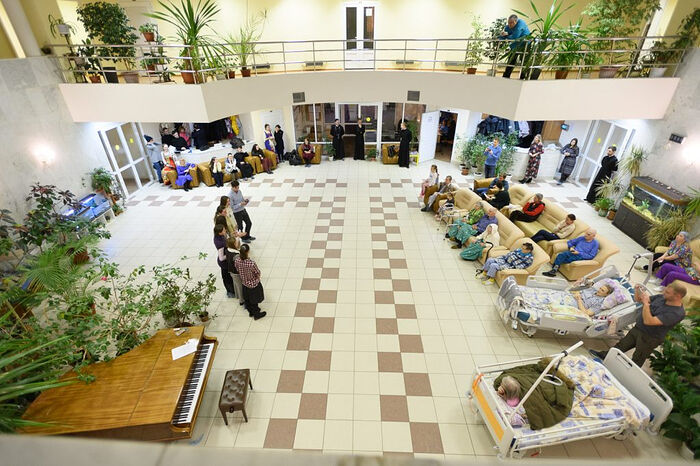Nowadays, the concepts of the ecclesiastical and the secular are so divided that some believers have the feeling that they live two lives: one in the Church, and the other beyond its walls. What should you do in order to remember that you are a Christian in your everyday life as well? We talked about this with Priest Nikolai Konyukhov, cleric of the Church of the Holy Trinity at Saltykov Bridge, Moscow.
—Indeed, there is a problem here. On the one hand, the material is always opposed to the spiritual. The Apostle Paul wrote about it, and the legendary Soviet rock singer Victor Tsoy (1962–1990) sang about it: “There is a war between earth and heaven.” Clearly if you have embarked on the path of spiritual ascent, secular and material things will distract you. They can captivate you completely, so you will have no time for spiritual life, which is the most important thing. It is a question of priorities: You devote more time to the things you consider more important to you. You can fall into an extreme, into a false dichotomy—to choose only the spiritual life or only the material. After all, we have one life, and it is necessary to maintain the right balance.
Some modern Orthodox read that some hermit chose the spiritual path, abandoned everything and left the world to work out his salvation. This option is possible, but not when you have three children, a mortgage and obligations to your family and society. This does not mean that you cannot lead a spiritual life. It is about which priorities prevail—the spirit or the body.
—How can we prioritize correctly in the twenty-first century?
—In modern conditions, a Christian who has a family, certain responsibilities in society, who works and realized himself creatively, can combine these things. The question is what he will put first. We usually put ourselves first because of our weakness. This is the wrong approach. If you serve yourself, in Christianity it is called the sin of pride, selfishness. As a result, this leads a person to self-destruction. This does not give him the desired happiness, but leads him to personal degradation.
As Christians we know that true happiness is in love. An integral part of love is sacrifice, when you are a giving system; give joy to others, share something, learn not to take, but to share, not to be greedy, but generous. Here everyone should understand that if it is important to you, then you must devote time to it. When you say that you have no time to go to church and pray, that you have a lot of work and responsibilities, there is some deceitful in this—if you consider your appearance important, you will visit a cosmetologist and have your nails done. If your friends are important to you, you will find time to meet with them against all the odds. If you care about your health, you will go to the gym, get up early to be on time for your workout. Unfortunately, in this system God is far from being in the first place. And it does not mean that God will start loving us less—it’s just that we ourselves show Him that He does not matter to us and it is we who distance ourselves from Him.
In order to combine material and spiritual life you just need to set priorities and show by your efforts and resources what matters to you. If God matters to you, then give Him time. The Apostle Paul said, Rejoice evermore. Pray without ceasing. In every thing give thanks (1 Thess. 5:16-18). It is necessary to show this by deeds, and your material life will become more successful and fulfilling—it will make sense. As we read in the Holy Scriptures, it will become a more abundant life (cf. Jn. 10:10).
—How in the practical sense can we stay focused on our inner life and realize daily that our spiritual life continues even on weekdays, when you have no opportunity to attend services?
—Of course, when we are in the church, we manage to stay spiritually attuned: it is easier to focus on the words of prayer, and everything is conducive to this. When we go outside the church (especially if we come to work where there are mostly secular people and not very pious conversations begin, most of which are discussions with colleagues, current affairs and the authorities), our spiritual attunement often disappears. Although some people say being at church in the morning, praying and receiving Communion gives them a charge for the whole work day. Here the question is in the person himself and the “law of conservation of energy”— how much grace you have received, and how many “holes” you have that you lose grace so quickly. Moreover, we read in the Holy Scriptures that it is not what enters a person, what he has heard and with whom he has communicated that defiles him, but those things which proceed out of the mouth come forth from the heart; and they defile the man (Mt. 15:18). We should keep an eye on what we give to this world.
The fact that the world is not well disposed to us is no longer a secret. In such circumstances it is hard to remain a spiritual Christian. Christ said: If they have persecuted Me, they will also persecute you (Jn. 15:20). He warned His disciples. When you leave the church, you should not “take off” your Christianity—you should go further. It is in difficult situations, intrigues at work, problems of family life that we demonstrate whether we are real Christians or not.
—This is not easy…
—In general, the whole world is the house of God. As we pray in the church, so we must keep prayer in our hearts at work. As we do not swear in the church, so we should not swear at work. We must control our tongues and thoughts, and kindle kindness in our hearts. Having received grace from the Lord and the joy of communion with God in the church, you should spread it to people. When you come to work or home, you should remember that you do not cease to be a Christian, so don’t be afraid to ask the Lord for help. Say, “Lord, I am weak—help me, inspire me to lead a spiritual life!” The most important thing is not to try to educate other people, but to educate only yourself. As the poet Vladimir Mayakovsky (1893–1930) wrote, “Shine always, shine everywhere.” He took this slogan from the Gospel. And Christ said that we should shine to people through our kindness and mercy. And we should be able to protect ourselves from the negative content that exists. Sometimes Christians themselves look for this negative content. You can work in a holy place, but come home and sin in other things. So don’t think that you need to find the perfect place. You should work where the Lord has blessed you.
—Each one of us has his own weaknesses and situations that are hard for us to endure. What should we do in such cases when we find ourselves in unpleasant circumstances because of our neighbors?
—On the one hand, living in society is our reality and we need communication. On the other hand, we may often dislike people, they may be “uncomfortable”. In general, everybody is selfish and thinks first of all of himself. But Christianity says that we must overcome our animal egoism, give and accept other people, just as Christ accepts them. He says that He causes the sun to shine on both sinners and the righteous (cf. Mt. 5:45). When we do not benefit from loving a person, but we love him, this is Christian love. Only God can love like that—our task is to learn this. When we meet other people, we learn to accept them as they are and accept their experiences.
On the other hand, we must learn to protect our boundaries without conflicts and tantrums. If you want one thing and another person wants another, there is always a system of compromises that allows you to achieve the right result with the right approach. This is a culture of communication in which we do not criticize, but tell others about our feelings. We often criticize others, but it is important to us as Christians to talk about our feelings. There is a hope that each one of us will first of all talk about his feelings, notice other people in front of him, overcome his animal egoism, and learn from God love and acceptance. When hermits went into solitude and began their spiritual labors, after a while the Lord would appear to them and tell them to leave the desert and go to the city, to people, because it is impossible to learn to love God if you have not learned to love people—at least one person to begin with. If the Lord sends you people, you should not reject them. Friends, colleagues, and all our nearest and dearest are sent by God so that we can eventually be saved.
—Sometimes a person who leads a spiritual life begins to be afraid of any manifestations of emotions, including negative ones, considering it a sin. What does the phrase from the Holy Scriptures mean: Be ye angry, and sin not (Eph. 4:26)?
—When we say, “Be angry, but do not sin,” we mean that a person can be irritated. This is not a sin; the irritable power of the soul is given to us by God. If we see someone offending a pregnant woman, we cannot remain indifferent to this, and righteous anger boils up in us.
But irritation can also turn into sin, into spite. When a person is angry, he commits acts that can be regarded as sinful, and he regrets them when he comes to his senses. In order to prevent irritation from turning into anger we should understand what exactly annoys us and how to do the right thing in this situation. Naturally, a wise person who considers himself a Christian turns to God. Even if he just makes the sign of the cross, he will be able to overcome anger, so it is vital to make sure that your irritation does not turn into anger. If we get annoyed at some actions of our close ones, we should remember God, ask Him for wisdom so as not to aggravate the situation and not to respond with evil to evil. The Lord can teach us and inspire us to do the right things. And even if we react to external factors, it will help us.
—Sometimes there are people around who seem to especially drain our inner resources. How can we not develop neuroses in trying to keep the commandment of loving others?
—In order not to develop neuroses and not burn out it is very important to fill yourself up. This refers to Christ’s words about blind leaders of the blind (Mt. 15:14). If you are not filled with love, you cannot warm other people. It is important to every Christian to fill himself with Divine love before trying to come to love other people. First of all, through spiritual life, communion with God, fulfillment of the commandments and participation in the sacraments. The Lord sends us grace and gives us great strength with which we help others. But we must not forget that we consist not only of the spirit, but also of the soul.
It is very important for us to develop spiritually, communicate with good people, listen to good music, fill our souls, take care of our health, eat healthily and sleep well. A person who is filled physically, mentally and spiritually can give something to other people and not develop neuroses. He will not give his last, but will give what he has. But if he has no love, is exhausted, irritated, and he is asked to babysit or go to work, he will only lose his temper.
You should understand one thing: It is always uncomfortable to love your neighbors, and it is impossible to love your neighbors while remaining in the comfort zone. You always have to sacrifice your selfishness. It is clear that it is uncomfortable and unpleasant. It is very difficult for a person to love, because he tries to meet his own interests and maintain comfort, and is not ready to sacrifice something for the sake of others.








